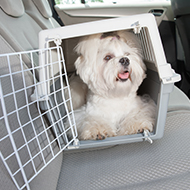Northern Ireland raises concerns over pet travel regulations

People travelling to NI with their pet from the UK are now required to get their pet vaccinated against rabies and treated for tapeworm.
The government of Northern Ireland (NI) has raised concerns over the new pet travel regulations following Britain's exit from the EU.
Under the new legislation, people wishing to travel to NI with their pet from Great Britain are required to get their pet vaccinated against rabies and treated for tapeworm - procedures which were previously unnecessary given the tapeworm and rabies-free status of NI and the Republic of Ireland.
In a letter to the Defra secretary George Eustice and the European Commission, agriculture minister Edwin Poots calls for a common-sense approach to reduce 'unnecessary' treatments and ensure that owners of assistance animals are not adversely affected.
Speaking about the issue, the Minister said: “As a result of the NI Protocol, Northern Ireland’s pet owners are now facing onerous and unnecessary documentary checks as well as unjustified veterinary treatments, for diseases that we do not have.
“I have written to the Secretary of State George Eustice and the European Commission to ask for common sense and more specifically, a Common Travel Area to be applied between GB and NI and ROI – this is not unreasonable and would alleviate the real and serious concerns of pet travellers across all jurisdictions.”
He continued: “A worrying outworking of these new requirements is that no thought has been given to the difficulties caused for assistance dog users and assistance training puppies. This means that some of the most vulnerable in our society are being directly affected – this cannot and must not be the case.
“I trust that the Defra Secretary of State and the European Commission will consider and recognise the impact of the concerns I have raised and will work with me to find a pragmatic and sensible solution to these issues.”



 The latest
The latest